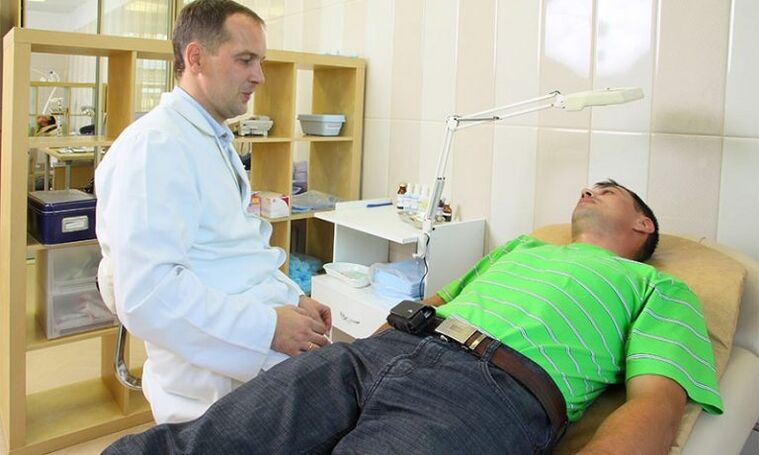The beneficial outcome of treating any disease depends entirely on the doctor, and this is even confirmed by the doctors themselves. The same goes for prostatitis, as this complex male disease requires a correct diagnosis and complex and competent therapy in the future.

It’s hard to believe in it, but even the duration of treatment depends entirely on the doctor. Inflammation of the prostate manifests itself in many ways, from urinary problems to high fever. If I have similar symptoms and I suspect this disease, which doctor should I go for due to prostatitis?
Urologist - doctor for the treatment of prostatitis
So if a man notices certain problems in the genitals, and if there are "problems" with the work of the urinary system, he should see a single doctor - a urologist. At the first order in the surgery, it is important to pay attention to how the doctor does his or her job, because the duration and outcome of the therapy will depend on him or her from now on.
Moreover, if possible, it is advisable to consult several doctors of this specialization at the same time. However, you must first go through a number of studies to visit your urologist’s offices with ready-made results.
How does a urologist diagnose prostatitis?
The first thing you should expect from a urologist is a medical history. That is, the doctor has a conversation with the patient in which he clarifies some questions about his personal life, including his intimate life, and asks in detail about any complaints or symptoms.
Further examination of the patient will be required. Feeling is one way in which a patient is examined by a doctor to determine the size, texture, and sensitivity of the prostate. Based on this, the urologist can make a preliminary diagnosis of the presence of prostatitis.
To confirm the diagnosis, your doctor will prescribe a series of tests. Blood and urine tests are mandatory, and the prostate secret is often removed to determine the number of leukocytes, amyloid bodies, and lecithin particles.
Analysis of urethral duct secretion will help determine if the urethritis has affected the urethra. To do this, smear with a probe with a special swab, which is placed directly into the urethra.
Blood cultures are performed to determine the nature of prostatitis and if an infectious etiology is suspected. It helps identify a group of pathogenic microorganisms that have settled in a man’s body.
Based on the extent to which the doctor conducts a comprehensive examination and how many or few examinations he or she requires, it can be determined which doctor should be consulted for prostatitis - a urologist at the outpatient clinic at the place of registration, or someone who works at another institution. . .
What other doctors are involved in treating prostatitis?
It is already known which doctor to consult for acute or chronic prostatitis, but you also need to know that it is not just the urologist who needs to see a sick person.

In the treatment of inflammation of the prostate, physiotherapeutic methods are often prescribed to influence the inflammatory process in the organ. So for the procedures recommended by the urologist, the patient will see a physiotherapist.
These procedures include:
- Baths;
- electrophoresis;
- Magnetic field;
- Ultrasound;
- Plating;
- Light therapy;
- Inductothermia;
- Microwave therapy;
- Laser therapy.
An effective treatment regimen cannot be without taking measures to strengthen the immune system. This means that another doctor involved in treating prostatitis is an immunologist.
By the way, the question of which doctor to go to for chronic prostatitis can be answered by an immunologist, but only after talking to the urologist and having the patient's blood and urine tested.
Prostatitis in this form requires the proper and trouble-free functioning of the immune system, and only an immunologist can prescribe the appropriate medications.
Genital problems, especially in chronic prostatitis, often have a detrimental effect on the male psyche. For him, the inability to have a full sex life is like the end of the world. There can be complexities associated with this, stress, anger and deep depression.

The psychotherapist usually not only talks to the patient, but also prescribes sedatives to help him cope with the depressed state and tune in to the treatment.
The psychotherapist has a key role to play in treating prostatitis because if the patient regains self-confidence and believes in recovery, it will come much faster.
If there is no urologist in the office but there is an andrologist, you can contact him or her. He specializes exclusively in male diseases, which include prostatitis.
























